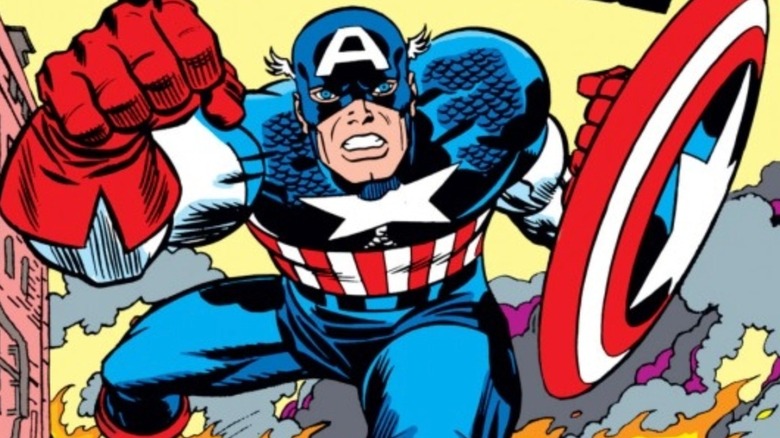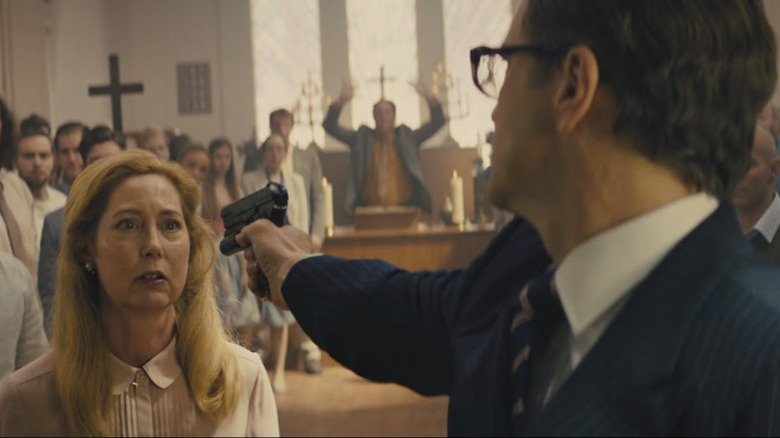Kingsman Has A Curious Plot Similarity To A Marvel Comic Starring Captain America
Matthew Vaughn's "Kingsman: The Secret Service" is a film about social class. Our hero Eggsy (Taron Egerton) comes from the working class. So, as he trains to be a Kingsman spy, he's bullied by the other students, who are all from the upper class, and is dismissed by the agency leader Chester King (Michael Caine).
Then there's the antagonist, Richmond Valentine (notice the first syllable of that name). Played by Samuel L. Jackson, Valentine is a tech billionaire who's become the sort of villain right out of the Bond movies he watched as a kid. The Valentine Corporation's hot new product is a SIM card that offers free internet and cellular service — at a great cost. The cards emit a signal that induces rage in the human brain; Valentine plans to let the masses kill themselves, slowing down global warming with Thanos-style population control.
In blockbusters of this sort, the villains and their evil plans usually act outside the law. Valentine's terrorism, though, is state-sanctioned; almost all of the world's business and political leaders (including the U.S. President) are in on it and have been given immunity from the signal. Class solidarity isn't just for the working man.
While neither Vaughn nor his co-writer Jane Goldman have confirmed this influence, Valentine's plot in "Kingsman" and the themes present have similarities to an earlier work. Surprisingly, not a James Bond movie like most of "Kingsman" lovingly pastiches, but a Captain America comic: "Madbomb."
The Madbomb of Marvel and Kingsman
Captain America was co-created by Joe Simon and Jack Kirby in 1941. Kirby returned to write and draw the ongoing "Captain America" comic in 1975; his second run lasted from issues #193 to #214.
Since the American bicentennial and "Captain America" issue #200 were both on schedule for 1976, Kirby decided his flag-draped hero needed to commemorate this once-in-a-lifetime anniversary. So, he wrote an eight-issue epic about Cap and Falcon unraveling a conspiracy to overthrow America on her 200th birthday. The perpetrators are a group called the Elite, who claim descent from the former British overlords who fought the American Revolution (their leader is even named "Lord Taurey," a play on "Tory").
The Elite believe democracy is evil and inequality, with themselves on top, is the rightful way of the world. How do they intend to overthrow America? With "Madbombs," or small cylindrical devices (containing cloned brains) that emit signals to whip up people into rage. With the Madbombs culling Americans and depriving them of free thought, the Elite will seize control.
The animus of "Madbomb" can feel like simple patriotism, but it's more than that; Kirby served in the European theater during World War II, so he saw firsthand what happens when countries sign away their freedom. "Madbomb" is fantastical pulp but its still-resonant message is akin to Sinclair Lewis' "It Can't Happen Here" — America will only be "the land of the free" if we diligently fight to make it so.
The Russo Brothers considered adapting "Madbomb" for "Captain America 3," but Marvel Studios Kevin Feige rejected the pitch in favor of "Civil War" on the grounds it wasn't "big enough." While "Kingsman" is an imperfect film, its politics are more honest and meaningful than Marvel Studios is willing to let Captain America be.

